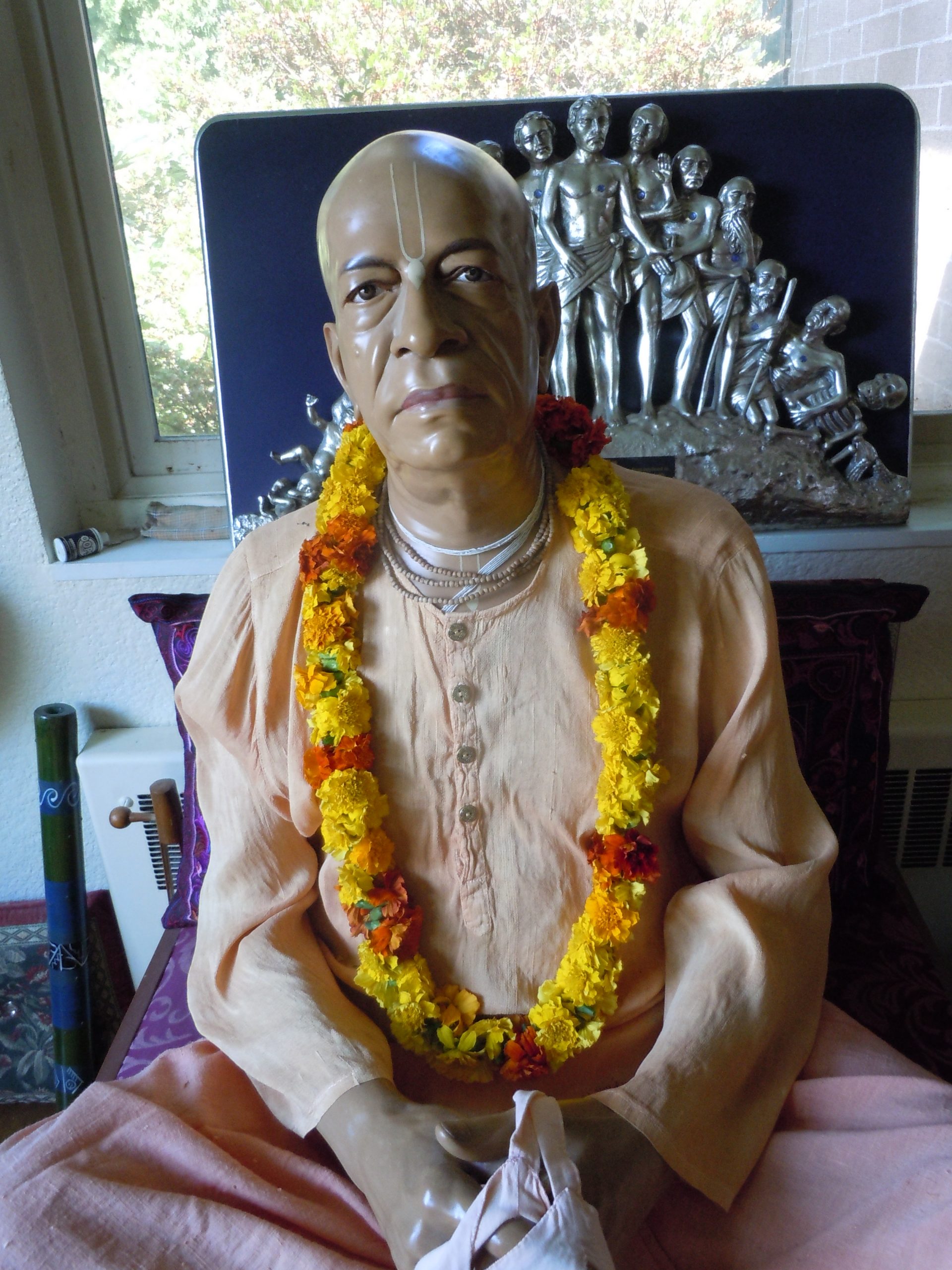SB 3.27.27 purport..Anyone engaged in devotional service to the Supreme Personality of Godhead is known as a devotee, but there is a distinction between pure devotees and mixed devotees. A mixed devotee engages in devotional service for the spiritual benefit of being eternally engaged in the transcendental abode of the Lord in full bliss and knowledge. In material existence, when a devotee is not completely purified, he expects material benefit from the Lord in the form of relief from material miseries, or he wants material gain, advancement in knowledge of the relationship between the Supreme Personality of Godhead and the living entity, or knowledge as to the real nature of the Supreme Lord. When a person is transcendental to these conditions, he is called a pure devotee. He does not engage himself in the service of the Lord for any material benefit or for understanding of the Supreme Lord. His one interest is that he loves the Supreme Personality of Godhead, and he spontaneously engages in satisfying Him.
The highest example of pure devotional service is that of the gopīs in Vṛndāvana. They are not interested in understanding Kṛṣṇa, but only in loving Him. That platform of love is the pure state of devotional service. Unless one is advanced to this pure state of devotional service, there is a tendency to desire elevation to a higher material position. A mixed devotee may desire to enjoy a comfortable life on another planet with a greater span of life, such as on Brahmaloka. These are material desires, but because a mixed devotee engages in the service of the Lord, ultimately, after many, many lives of material enjoyment, he undoubtedly develops Kṛṣṇa consciousness, and the symptom of this Kṛṣṇa consciousness is that he is no longer interested in any sort of materially elevated life. He does not even aspire to become a personality like Lord Brahmā.
Note-In the above purport Srila Prabhupada explains the mentality of mixed devotees in that we want to be engaged in spiritual activity– for the spiritual benefits. Ore even if we want to have knowledge of God-Krsna or know our eternal relationship with Krsna or just to know Krsna as He is , what to speak of relief from material misery, Prabhupada says above-this is all in the category of mixed devotee- not a pure devotee yet.
SB 3.28.2 purport...In this verse there are many important words which could be very elaborately explained, but we shall briefly discuss the important aspects of each. The final statement is ātmavic-caraṇārcanam. Ātma-vit means a self-realized soul or bona fide spiritual master. Unless one is self-realized and knows what his relationship with the Supersoul is, he cannot be a bona fide spiritual master. Here it is recommended that one should seek out a bona fide spiritual master and surrender unto him (arcanam), for by inquiring from and worshiping him one can learn spiritual activities.
Note-So here again above, more proof of who is a pure devotee or actual spiritual master. Unless one actually knows his svarupa siddhi or eternal relationship with God-Krsna, then he cannot be a bona fide spiritual master or guru. How many devotees have we met who know this? I have only met one….
Once Srila Prabhupada was asked this question and he said-“that you dont require to know”, In other words you rascal, you fool, first become qualified yourself and then when you are so qualified then you can ask me, your spiritual master, that elevated question which you have no way of understanding at all in your present condition of life.
SB 3.28.34 purport...Here it is clearly mentioned that meditation, which is an action of the mind, is not the perfect stage of samādhi, or absorption. In the beginning the mind is employed in attracting the form of the Supreme Personality of Godhead, but in the higher stages there is no question of using the mind. A devotee becomes accustomed to serving the Supreme Lord by purification of his senses. In other words, the yoga principles of meditation are required as long as one is not situated in pure devotional service. The mind is used to purify the senses, but when the senses are purified by meditation, there is no need to sit in a particular place and try to meditate upon the form of the Lord. One becomes so habituated that he automatically engages in the personal service of the Lord. When the mind forcibly is engaged upon the form of the Lord, this is called nirbīja-yoga, or lifeless yoga, for the yogī does not automatically engage in the personal service of the Lord. But when he is constantly thinking of the Lord, that is called sabīja-yoga, or living yoga. One has to be promoted to the platform of living yoga.
One should engage in the service of the Lord twenty-four hours a day, as confirmed in the Brahma-saṁhitā. The stage of premāñjana-cchurita can be attained by developing complete love. When one’s love for the Supreme Personality of Godhead in devotional service is fully developed, one always sees the Lord, even without artificially meditating on His form. His vision is divine because he has no other engagement. At this stage of spiritual realization it is not necessary to engage the mind artificially. Since the meditation recommended in the lower stages is a means to come to the platform of devotional service, those already engaged in the transcendental loving service of the Lord are above such meditation. This stage of perfection is called Kṛṣṇa consciousness.
Note-by the chanting of Hare Krsna mantra our mind becomes purified-ceto darpanam marjanam. And when the mind becomes purified our senses will become purified since the mind controls all the senses. When we are still at the stage of having to force our mind to think of Krsna,(having to chant our rounds daily) because it does not automatically come, that is called lifeless yoga. We are still in conditional life, not liberated life. So if somebody is having a hard time just chanting 16 rounds a day, what does that tell us about the condition of his or her mind?
You think such a person can become guru?
SB 3.28.38–The body of such a liberated yogī, along with the senses, is taken charge of by the Supreme Personality of Godhead, and it functions until its destined activities are finished. The liberated devotee, being awake to his constitutional position and thus situated in samādhi, the highest perfectional stage of yoga, does not accept the by-products of the material body as his own. Thus he considers his bodily activities to be like the activities of a body in a dream.
PURPORT-The following questions may be posed. As long as the liberated soul is in contact with the body, why don’t the bodily activities affect him? Doesn’t he actually become contaminated by the action and reaction of material activities? In answer to such questions, this verse explains that the material body of a liberated soul is taken charge of by the Supreme Personality of Godhead. It is not acting due to the living force of the living entity; it is simply acting as a reaction to past activities. Even after being switched off, an electric fan moves for some time. That movement is not due to the electric current, but is a continuation of the last movement; similarly, although a liberated soul appears to be acting just like an ordinary man, his actions are to be accepted as the continuation of past activities. In a dream one may see himself expanded through many bodies, but when awake he can understand that those bodies were all false. Similarly, although a liberated soul has the by-products of the body—children, wife, house, etc.—he does not identify himself with those bodily expansions. He knows that they are all products of the material dream. The gross body is made of the gross elements of matter, and the subtle body is made of mind, intelligence, ego and contaminated consciousness. If one can accept the subtle body of a dream as false and not identify oneself with that body, then certainly an awake person need not identify with the gross body. As one who is awake has no connection with the activities of the body in a dream, an awakened, liberated soul has no connection with the activities of the present body. In other words, because he is acquainted with his constitutional position, he never accepts the bodily concept of life.
Note-The above verse and purport is a very nice way to understand what happens in the body of a liberated soul. First of all the pure devotees body is directly taken charge of by God-Krsna. It is not under the control of the material nature (3 modes) like ours. We, as conditioned souls mostly think I am doing this, he or she is doing that, not really understanding that nobody is dong anything but ones actions and body are being carried out by karma and the material energy. Whereas the pure devotees actions are being shown to us mortals thru Krsna’s eternal internal energy, Daivi Prakriti, the Divine energy. Prabhupada gives a nice example of how one sees himself in a dream at night, but when he wakes up he knows that those bodies in his last nights dream were dreams only and now gone. So if one can be smart enough to know and understand this, then why would a person or pure devotee place any more importance on his daytime so called dream life? He may have spouse kids, home, job, relatives, but they are just like last nights dream body which now does not exist. And in due course of time, this present body and its associated dreams will also not last. We just put more stock in the daytime dream because it apparently lasts longer– than last nights dream. But factually both are dreams and the pure devotee is in no way affected by either of them.
SB 3.28.4 purport...The word asteyam is also very important for a yogī. Asteyam means “to refrain from theft.” In the broader sense, everyone who accumulates more than he needs is a thief. According to spiritual communism, one cannot possess more than he needs for his personal maintenance. That is the law of nature. Anyone who accumulates more money or more possessions than he needs is called a thief, and one who simply accumulates wealth without spending for sacrifice or for worship of the Personality of Godhead is a great thief.
Svādhyāyaḥ means “reading the authorized Vedic scriptures.” Even if one is not Kṛṣṇa conscious and is practicing the yoga system, he must read standard Vedic literatures in order to understand. Performance of yoga alone is not sufficient.
Note–the above is an indirect way to understand who is a pure devotee and who is a thief. If we collect more than we need, to keep body and soul together or what is our allotted destiny then we are considered thieves. Srila Prabhupada wanted all his disciples to donate 50% of their annual income to Krsna conscious activities. Otherwise the daytime work they were doing was un authorized by the spiritual master. So karma yoga is the first rung on the ladder of bhakti back to home back to Godhead.
Dec 30 1976
In our śāstra charity is recommended to be given to the high-class men, brāhmaṇas and Vaiṣṇavas. They know how to spend money. Therefore dātavyam iti yad dānaṁ tad dānaṁ sāttvikam ucyate. Just like this Kṛṣṇa consciousness movement, they are appreciating. So all the charity should come here. Then it is properly utilized. Because we do not use a single paisa for anything of sense gratification. We do not even smoke, we do not take tea, we lie down on the floor. Not a single paisa is spent for our sense gratification. Everything is utilized for Kṛṣṇa. Therefore all charity should come here. Properly spent. But if we misspend, that is our fault. Single paisa we spend for our sense gratification, that is fault of us. And people should give at least fifty percent of their income to this movement. Twenty-five percent to the family and twenty-five percent let him keep for himself in case of emergency. This is the example shown by Rūpa Gosvāmī.
Feb 3 1975 Hawaii conversations
Devotee (1): Śrīla Prabhupāda, where does someone derive his authority…
Prabhupāda: The guru is authority.
Devotee (1): No, I know, but for his actions other than just following the four regulative principles and chanting sixteen rounds. He does so many other things during the day. Where does he derive his authority if he’s not, let’s say, living in the temple?
Prabhupāda: I do not follow. The authority is guru. You have accepted.
Jayatīrtha: Say I have some outside job, I’m living outside, but I’m not giving 50% of my income. So then that work that I’m doing, is it actually under the authority of the guru?
Prabhupāda: Then you are not following the instruction of guru. That is plain fact.
Jayatīrtha: So that means that whole activity during the day, working, that means I am not following the instruction of the guru. It’s unauthorized activity.
Prabhupāda: Yes. If you don’t follow the instruction of guru, then you are fallen down immediately. That is the way. Otherwise why you sing, yasya prasādād bhagavat-prasādo **. It is my duty to satisfy guru. Otherwise I am nowhere. So if you prefer to be nowhere, then you disobey as you like. But if you want to be steady in your position, then you have to follow strictly the instruction of guru.
Hare Krsna
damaghosa das







